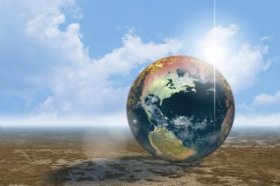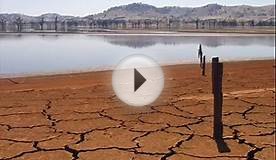Human Impact on global warming
 Global temperature are expected to continue rising, but cutting emissions now will lessen the steepness of the increase (see References 1, page 9).
Global temperature are expected to continue rising, but cutting emissions now will lessen the steepness of the increase (see References 1, page 9).
The consensus in the scientific community is that global warming is caused by human activities, primarily the burning of fossil fuels. Changes attributed to global warming include rising temperatures, retreating glaciers, earlier snowmelt and an increase in heavy downpours. (See References 1, page 9) What is less talked about is the effect global warming has on the human body. In 2009, the U.S. Global Change Research Program presented a report to Congress that summarizes current and future impacts of climate change on the U.S., including how it directly affects humans.
Heatwaves
As extreme heat waves become more common, there is an increased risk of heat-related illness and death. The elderly, the very young and diabetics face the highest threat. The U.S. Global Change Research Program report presents two possible scenarios, based on whether emissions over the next century are low or high. Under the high emissions version, average temperatures rise 6 to 11 degrees Farenheit, increasing the number of days each year with temperatures in excess of 100 F. By 2100, parts of Texas that typically reach 100 F for 10 to 20 days annually are expected to see 100 days with temperatures exceeding 100 F. In the same period, Los Angeles' heatwave days would double and Chicago's would quadruple. (See References 1, pages 90-91)
Poor Air Quality
Air masses tend to stagnate with warmer temperatures, making it easier for smog to form and compromising air quality. In California, smog is projected to form more often, last longer and be more intense. By 2100, Los Angeles and the San Joaquin Valley could have a 75 to 85 percent increase in smog days under the high emissions scenario and a 25 to 35 percent spike under the lower emissions scenario. Breathing smog triggers asthma attacks, irritates lungs and is associated with premature death, according to the U.S. Global Change Research Program report. (See References 1, pages 92-93)
Extreme Weather
Events like tornadoes, floods and hurricanes are predicted to increase as a result of global warming, with a corresponding rise in storm-related injuries, illnesses, emotional trauma and death. The U.S. Global Change Research Program report noted that in the 2005 hurricane season more than 2, 000 people were killed, more than double the seasonal average of the past 65 years. After extreme weather events, people suffer from carbon monoxide poisoning resulting from use of portable generators when storms knock out power. Additionally, evacuees suffer intestinal illness, depression and post-traumatic stress disorder. (See References 1, page 94)
Plant Problems
Global warming allows spring and flower pollens an earlier start, meaning a longer and more intense allergy season. Studies cited in the U.S. Global Change Research Program report found that when higher levels of carbon dioxide associated with global warming are combined with warmer temperatures, ragweed makes more pollen and makes it for a longer time. Additionally, warmer climates allow poison ivy plants to become more allergenic and grow with more vigor, and rash-causing stinging nettles and leafy spurges grow stronger. (See References 1, pages 96-97).

